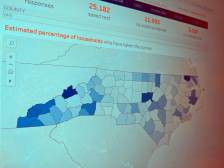North Carolina’s bleak performance audit of 84 IT projects
Vendors who have ever worked on a government IT contract know that there are often discrepancies between initial estimates and actual hours worked and dollars spent on the project. In a way, overages (time and budget) have become the unspoken status quo for many projects. The problem is state and local governments looking to cut waste and seek efficiencies are realizing that this new norm is counterproductive to their bottom line.
The North Carolina State Auditor’s Office released a performance audit on April 12 that called out 84 IT projects that cost the state a total of $356.3 million in overages, and took a total of 389 days longer than initial project estimates suggested. Essentially, these projects have cost twice as much and taken 65 percent longer than expected.
The audit highlighted some of the more glaring examples, such as the state’s Medicaid management information system, which was initially estimated to cost $92.7 million with the project completed in November 2011. However, the MMIS project ballooned to $229 million and now has a completion date of October 31, 2013. Another example is the NC toll collection management system project, which was expected to cost $19.8 million, but now has a revised budget of $41 million.
The most egregious project on the audit is the state’s tax information management system, which had early estimates of costing only $525,000, with a completion date of December 31, 2011. Nonetheless, the project exploded to $97.3 million and now has a due date of January 31, 2014.
The audit highlighted the seriousness in which the state of North Carolina is viewing this problem and pinpointed two main issues that have heavily contributed to the overages among state IT projects:
1. Actual costs and schedules differ significantly from original estimates, which can result in unplanned spending and resource use.
a. No standard practice for creating IT projects estimates
b. No independent validation of agency estimates
c. No accountability for unreliable estimates
2. Procedures do not ensure complete, accurate, and timely data.
a. No method to identify IT projects that circumvent the SCIO approval process
b. No assurance that historical IT project data is preserved
c. No oversight/review of self-reported IT project data from state agencies
d. No consequences/incentives to compel state agencies to submit IT project status reports in a timely manner
The auditor’s office made six recommendations to mitigate these issues:
- North Carolina Information Technology Services should develop and publish written guidance for developing state agency IT project cost and schedule estimates. The guidance should also describe the education, experience, and credentials needed by the personnel who develop the estimates.
- ITS should require state agencies to obtain independent validation of the accuracy and reasonableness of IT project estimates. Alternatively, ITS should require agencies to submit appropriate and adequate documentation so that ITS can evaluate and determine the accuracy and reasonableness of agency estimates.
- ITS should request that the General Assembly consider enacting state law to hold state agency managers accountable and require them to meet IT project cost and schedule estimates.
- ITS should develop and document a method to identify state agency IT projects that require the SCIO’s approval. ITS should also ensure that the EPMO Tool retains both historical and current information to allow for trending and analysis.
- ITS should develop and document procedures to verify state agency data in the EPMO Project Portfolio Management Tool.
- ITS should consider asking the General Assembly for the authority to ensure that ITS receives project status reports on schedule.
North Carolina’s new chief information officer, Chris Estes, agreed with all six recommendations produced from the audit and said ITS will address the issues found in the audit in the upcoming Statewide IT Plan, which is expected to be released on October 1, 2013.
The audit reviewed IT projects from December 2011 to October 2012, and selected only projects whose original cost and schedule estimate data was available. North Carolina has a total of 1,034 state IT projects contained in its Project Portfolio Management database, with 128 active IT projects valued at $1.7 billion. Besides the cost of the overages identified, the fact that only 84 out of 1,034 IT projects had enough information to be included in the audit to begin with more than justifies the audit’s findings and recommendations.
If taken seriously, the North Carolina 2014 IT plan will include hard and fast solutions to improve oversight and management of state IT projects moving forward. These solutions will likely come in the form of policy, procedure and personnel restructures that will affect existing contracts and future procurements. Vendors looking to do business with North Carolina should count on an extra layer of scrutiny during the procurement process, especially when it deals with pricing, scheduling, and the management and success rate of past IT projects.






